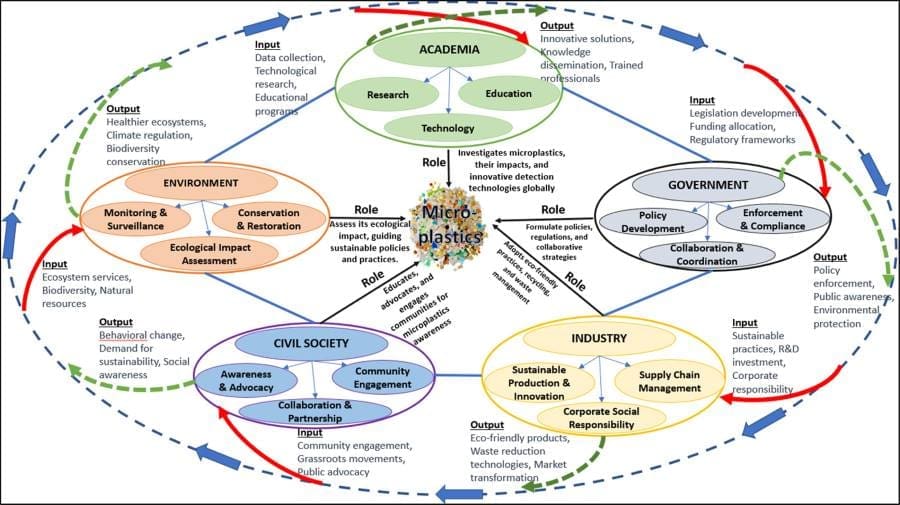Microplastics pollution has emerged as a pervasive global challenge, stemming from humanity’s reliance on plastic products and the resilience of these materials in the environment. Over time, plastics degrade into tiny fragments, infiltrating ecosystems and posing risks to wildlife, human health, and the broader environment.
Managing this issue is no simple task.
Microplastics come in a wide array of physical and chemical forms, follow diverse pathways into ecosystems, and complicate recycling efforts. Current analytical tools often fall short in identifying and quantifying microplastics effectively, and there is limited research on how public attitudes and behaviors influence this issue. Addressing such complexity, researchers argue, calls for a multifaceted strategy that unites stakeholders across society in a shared mission.

In a new study, a team of researchers highlights the quintuple helix framework as a promising approach to managing microplastic pollution.
First introduced in 2010, this framework takes an innovative stance by treating the environment not as a passive backdrop but as an active stakeholder in problem-solving. By bringing together academia, government, industry, civil society, and the environment, the framework seeks to create holistic solutions rooted in collaboration and knowledge exchange.
Central to the quintuple helix approach is its recognition of the interconnected roles each stakeholder plays. Academia provides essential contributions through data collection, public education, and technological advancements. Governments partner with stakeholders to craft and enforce regulations, while industries influence supply chains, develop sustainable products, and embrace corporate social responsibility.
Civil society groups amplify public awareness, advocate for policy change, and foster community involvement. The environment itself offers crucial insights through ecological monitoring, impact assessments, and conservation efforts.
Five helixes and the unique insights they offer to the microplastics challenge:
- Academia is essential in data collection and monitoring, educational programmes and public engagement, and technological advancements.
- Government collaborates with stakeholders to formulate and enforce regulation.
Industry is influential through supply-chain management, sustainable product development and corporate social responsibility. - Civil society organisations raise public awareness and advocate for policy change, and enable community engagement, collaboration and partnership.
- The role of the environment focuses on ecological impact assessment, conservation and restoration, and monitoring and surveillance.
This integrated model brings several key benefits to microplastic management. Policies developed under the quintuple helix approach are informed by diverse perspectives, leading to solutions that are practical, inclusive, and sustainable. For instance, Canada’s 2021 classification of plastics as toxic substances under the Canada Environmental Protection Act exemplifies the power of engaging multiple stakeholders.
The framework also fosters continuous improvement, enabling innovation through ongoing feedback loops. Organizations like the Ellen MacArthur Foundation, UNEP, and the International Trade Centre have demonstrated this potential by promoting sustainable packaging and circular economy practices.
By positioning the environment as a stakeholder, the model ensures that ecological resilience remains a priority. Standardized methods for assessing microplastic exposure and impact pave the way for more effective strategies to mitigate harm. Such efforts align closely with achieving the UN Sustainable Development Goals, underscoring the importance of planetary health.
The study concludes with a real-world example of the quintuple helix in action: Sunway City, Malaysia. Here, a plastic ban initiative brought together legislators, researchers, businesses, NGOs, and community groups to drive change. While the program showcased the framework’s potential, the researchers stress the importance of robust data collection to evaluate its long-term impact.
By emphasizing collaboration and knowledge co-production, the quintuple helix approach offers a hopeful path forward in tackling the complex issue of microplastic pollution. As the study illustrates, this model not only addresses environmental challenges but also fosters engagement, innovation, and resilience across society.
Journal Reference:
Dewika, M., Markandan, K., Nor Ruwaida, J., Sara, Y.Y., Deb, A., Ahmad Irfan, N. and Khalid, M., ‘Integrating the quintuple helix approach into atmospheric microplastics management policies for planetary health preservation’, Science of The Total Environment 954: 176063 (2024). DOI: 10.1016/j.scitotenv.2024.176063
Article Source:
Press Release/Material by Science of The Total Environment
Featured image credit: FlyD | Unsplash




